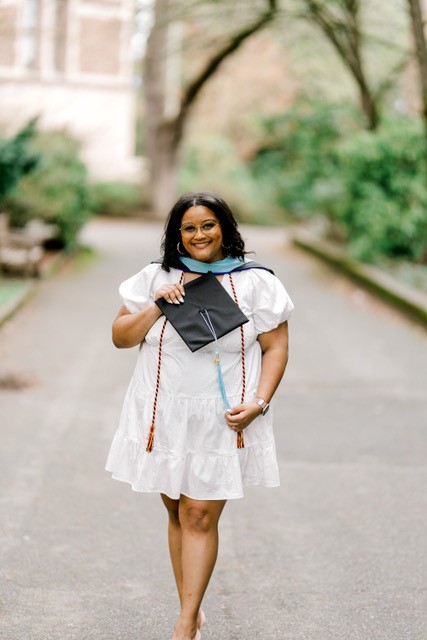Jada Holliday: A Journey of Advocacy and Academic Pursuit
Experiencing inequities first-hand inspired Jada to pursue a master's degree to address educational equity.
Growing up in Tulsa, Oklahoma, Jada Holliday saw first-hand the history, and results, of living in a place with unaddressed harsh racial inequities, which fueled her interest in educational equity. “In high school, I attended a predominantly white school 30 minutes away from my home because local schools lacked resources,” Jada says, “Being one of very few Black students made me learn how to advocate for myself to enter AP classes during school.”
This experience, coupled with the reality of attending a high school not representative of her identity or her community, highlighted the disparities in education for Black students in Tulsa, motivating Jada to pursue her bachelor’s in sociology at Baylor University. There, she engaged with the local community in Waco, Texas, and learned about its rich Black cultural history, while also advocating for racial equity during 2020.
Reaching her master’s

Her commitment to education and racial equity led her to pursue a master’s in Educational Foundations, Leadership, and Policy with a focus on Social and Cultural Foundations within the College of Education at the University of Washington. “I’m a researcher by nature and I knew I wanted to attend a public university,” Jada says.
During the application process, Jada questioned the UW about what they as an administration were doing to uplift Black and brown voices. So much in fact, that someone reached out and gave her the steps the College of Education had in play, specifically for students of color. “It made me more comfortable making the decision to come here and made it seem like UW cared what I had to say,” Jada says.
Moving to Seattle was a significant change. Jada noted the differences in moving from the south to the northwest by the large and vocal advocacy for the LGBTQIA+ rights, trans rights, and racial equity beyond the Black and white binary in Seattle. This level of public support was something she had not experienced in Texas, where she says displaying symbols, like pride flags and BLM banners, could lead to hostility and violence.
Community in Seattle
While building community in Seattle her first year, Jada worked in Seattle Public Schools, which solidified her decision to enter education. Her time was spent working as a program manager at Martin Luther King Jr. Elementary, a historic elementary school with a majority Black student population, faculty and staff. “Being a part of that community healed something in me,” Jada says. “Seeing the students speak up for themselves and how they interacted with their teachers made me want to stay another year, but I had to be realistic about my capacity and was grateful for the experience. It solidified my educational pursuits.”
Her second year at UW, Jada worked as a graduate student assistant for the Office of Graduate Student Equity and Excellence (GSEE), formerly known as GO-MAP. She was responsible for assisting in events such as Real Talk Tuesdays, Getting Connected and overall coordination and implementation of programs and events that serve graduate students of color and underrepresented graduate students. “I felt energized by the work I got to do and was genuinely happy to come to work,” Jada says.
Looking ahead
She graduated this May and is a recipient of the Bonderman Fellowship. With support from this fellowship, Jada plans to travel to Taiwan, South Korea, Thailand, Tunisa, Morrocco, and Zimbabwe to experience and honor the cultures and homelands of her friends and family. In the meantime, Jada plans on returning home to Tulsa to spend time with her biggest supports and cheerleaders – her family. She comes from a family that is equally passionate about their community and grass-roots organization to address gentrification and racial inequalities. “I plan on being as present as possible during my travels,” Jada says. “I don’t know what will happen after, but I’m looking forward to being in the moment.”
By: Tatiana Rodriguez, UW Graduate School
Published on June 21, 2024